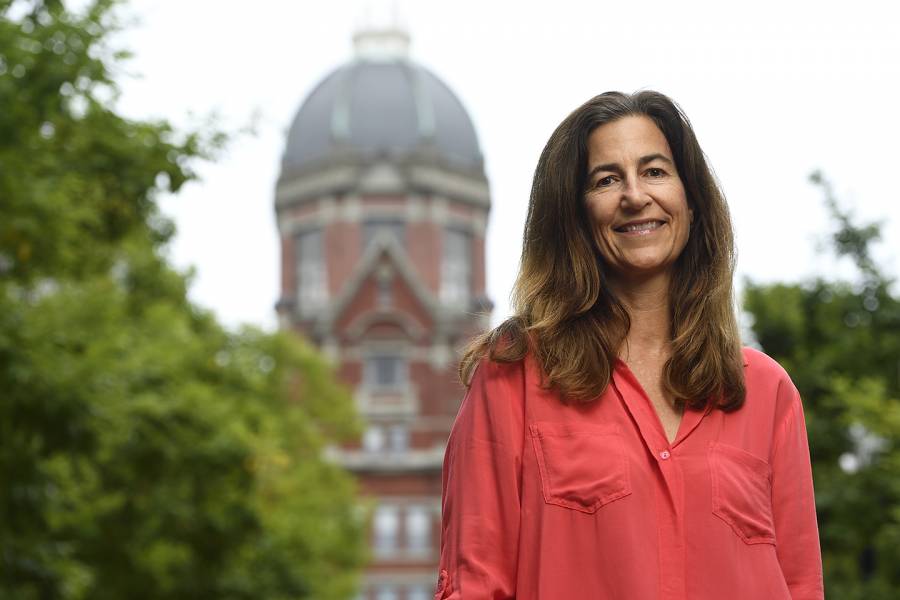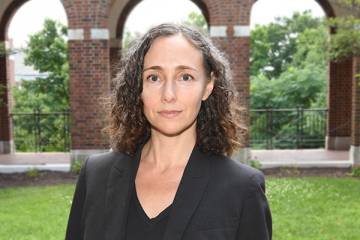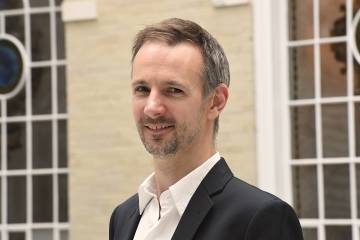Kathryn McDonald thinks it's important to look at health care from a patient-centered point of view. It's often the easiest place to spot trends and changes, she says.
Take, for instance, the changing way baby boomers access health care. As that population—which numbers roughly 76 million—reaches middle and older age, the home health aide industry in America has become one of the nation's most in-demand occupations, according to the U.S. Bureau of Labor Statistics. Likewise, the AARP reports that 90% of older adults say they want to age in place in their homes rather than in senior living communities or facilities specially designed to accommodate their needs.
Yet while patients of all ages increasingly access care from outside hospitals and clinics, the bulk of the research into patient safety and health care quality still takes place within those settings. McDonald says it's time for health care research to evolve.
"There's a shift happening right now," says McDonald, an expert in health care quality, patient safety, and organizational research. "More people are accessing different entry points for health care, and we need to think about their journey to staying healthy or dealing with a health crisis."
McDonald—the founding executive director of the Center for Primary Care and Outcomes Research at Stanford University's School of Medicine and also executive director of Stanford's Center for Health Policy in the Freeman Spogli Institute for International Studies—will soon join Johns Hopkins University as the Bloomberg Distinguished Professor of Health Systems, Quality, and Safety. She will hold primary appointments in the Johns Hopkins schools of Nursing and Medicine and joint appointments in the Carey Business School and the Bloomberg School of Public Health, and will be affiliated with the Malone Center for Engineering in Healthcare.
At Johns Hopkins, she plans to further her exploration of what makes for safe, affordable, and high-quality health care delivery systems and the factors that prevent health organizations from achieving that standard of care.
"Kathryn McDonald is a pioneer in bringing systematic and evidence-based approaches to the study of health care delivery," says Patricia Davidson, dean of the School of Nursing. "She has a track record of collaboration and innovation across disciplines and will bring with her new insights into the best practices for measuring health care outcomes to ensure patient safety for all people."
Johns Hopkins University Provost Sunil Kumar adds, "Kathy McDonald has a rare gift for understanding the problems that complicate health care delivery and developing solutions that work not only for health systems and their workers but also the patients themselves. We're proud to welcome her to Johns Hopkins, where she'll play a pivotal role in furthering the collaborations across our institution's divisions."
McDonald didn't always plan to enter the field of patient safety. After receiving her bachelor's degree in chemical engineering from Stanford University, McDonald spent three years working in the semiconductor industry, where she specialized in systems organization and optimization. Those experiences shaped her approach to the study of health care and her belief that improving safety and quality can occur simultaneously.
"I like to think about how things work, and I have a strong belief in the human capacity to learn and make situations and processes better," she says. "I'm also intrigued by complicated problems, so when I hear stories about things we do within the health care system or opportunities that we missed that caused real harms, I think about what the system can do to be more reliable."
After turning her attention to health care technology, she enrolled in graduate school at Northwestern University, where she graduated with distinction with a Master of Management degree before going on to receive her PhD in health policy from the University of California, Berkeley. She wrote her dissertation on diagnostic errors, a broad but important issue she plans to continue investigating while at Hopkins.
Her ongoing Diagnostic Errors and Disparities study, for example, examines the ways that a patient's age, race, and sex may contribute to errors in diagnoses and disparities in patient outcomes. McDonald hopes to understand how "visible factors" put young people, women, and African American people at risk for misdiagnoses of infections, cancer, and cardiovascular issues. The effort underscores McDonald's belief that patients themselves should remain at the center of the conversation about improving health care delivery.
"Keeping a patient-centered perspective is an obvious starting point for improving care because health delivery systems exist in order to care for patients," she says. "I don't see any other way to think about what research matters and why."
As a longtime team scientist, she is quick to point out that her research relies on interdisciplinary collaboration. She says she plans to collaborate with faculty colleagues and students across the university and to continue borrowing from other disciplines to optimize health care delivery. In a recent paper published by Medical Care, McDonald examines how health care delivery systems are organized to gain insights into how that structure affects the decision-making processes and the teamwork of its employees. She found that certain types of time pressures during patient encounters create missed opportunities for patient care.
"Everything in health care is complex, but organizations have a lot of influence on how frontline workers interact with and support patients as they travel on their unique care journeys," she says.
In addition to publishing more than 100 scholarly peer-reviewed studies and white papers, McDonald has published more than 40 government reports and developed tools for measuring patient safety and quality that have been used by private and public care providers alike. She was tapped by the Agency for Healthcare Research and Quality to create a series of reviews and seminal reports outlining practices for improving patient safety and health care quality, and also authored the Care Coordination Measures Atlas. She later created a set of standardized health care quality measurements called Quality Indicators for the agency that can be used to analyze administrative data from hospitals to identify potential quality concerns and track changes over time.
Those Quality Indicators from the AHRQ were implemented at the Johns Hopkins Hospital in 2012. According to a case study published in May, McDonald and her team's Quality Indicators helped Johns Hopkins Hospital improve its postoperative ventilator procedures and reduce the incidence of perioperative pulmonary embolism, hemorrhage, and hematoma.
"Kathryn McDonald's ideas have improved the lives of the patients, including here at Johns Hopkins," says Paul B. Rothman, dean of the School of Medicine and CEO of Johns Hopkins Medicine. "We're thrilled to welcome her to Johns Hopkins, where she can help us continue to develop and innovate health care delivery, here and across the country."
As the university's 46th Bloomberg Distinguished Professor, McDonald joins an interdisciplinary cohort of scholars at Johns Hopkins working to address major world problems and teach the next generation. The program is backed by a $350 million gift from Michael R. Bloomberg, a Johns Hopkins alumnus, founder of Bloomberg LP and Bloomberg Philanthropies, World Health Organization Global Ambassador for Noncommunicable Diseases, UN Secretary-General's Special Envoy for Climate Action, and former New York City mayor.
Posted in Health, University News
Tagged patient safety, bloomberg distinguished professors, kathryn mcdonald










